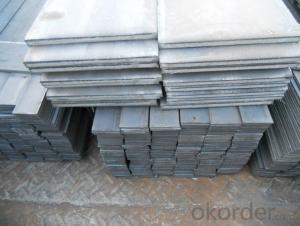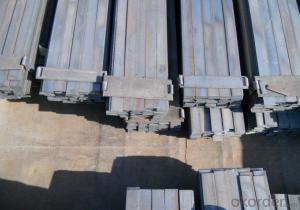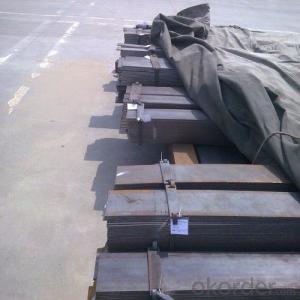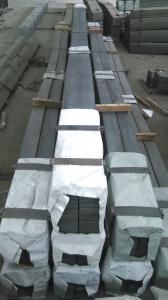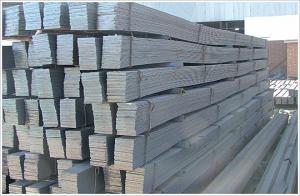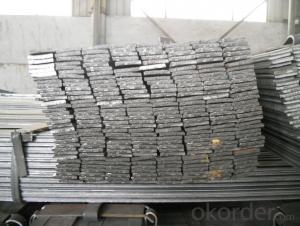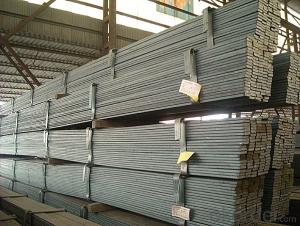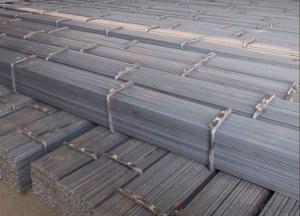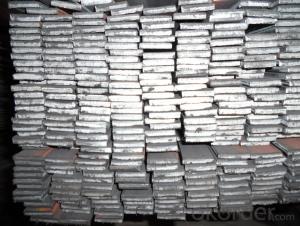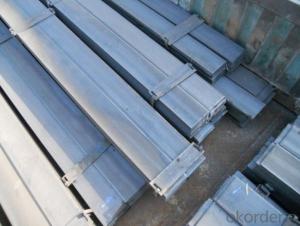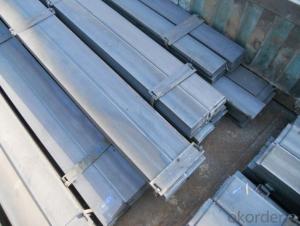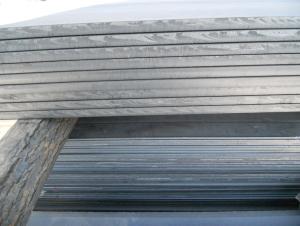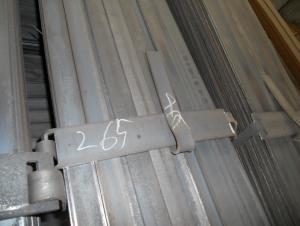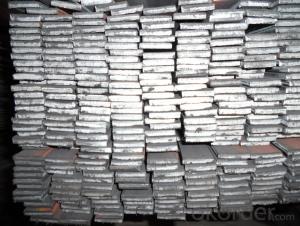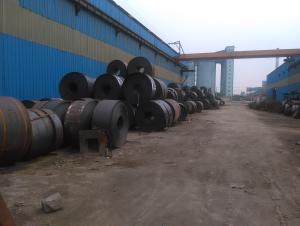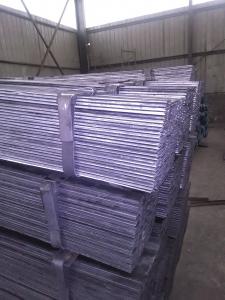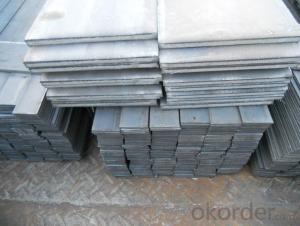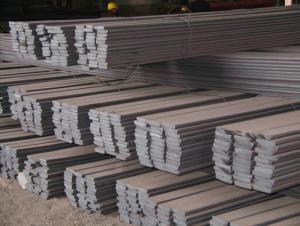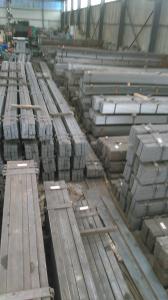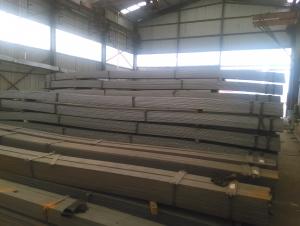Hot Rolled Flat Steel Bar in Grade Q235B
- Loading Port:
- Tianjin
- Payment Terms:
- TT OR LC
- Min Order Qty:
- 25 m.t.
- Supply Capability:
- 10000 m.t./month
OKorder Service Pledge
OKorder Financial Service
You Might Also Like
OKorder is offering high quality Flat Bar at great prices with worldwide shipping. Our supplier is a world-class manufacturer of steel, with our products utilized the world over. OKorder annually supplies products to European, North American and Asian markets. We provide quotations within 24 hours of receiving an inquiry and guarantee competitive prices.
Product Applications:
Flat Bars are ideal for structural applications and are widely used in the construction of buildings and bridges, and the manufacturing, petrochemical, and transportation industries.
Product Advantages:
OKorder's Flat Bars are durable, strong, and resist corrosion.
Main Product Features:
· Premium quality
· Prompt delivery & seaworthy packing (30 days after receiving deposit)
· Corrosion resistance
· Can be recycled and reused
· Mill test certification
· Professional Service
· Competitive pricing
Product Specifications:
Manufacture: Hot Rolled
Grade: Q195 – 235
Certificates: ISO, SGS, BV, CIQ
Length: 6m – 12m, as per customer request
Packaging: Export packing, nude packing, bundled
Chemical composition of Q235
Alloy No | Grade | Element(%) | ||||
C
| Mn
| S
| P
| Si
| ||
Q235
|
B
|
0.12—0.20 |
0.3—0.7 |
≤0.045 |
≤0.045
|
≤0.3
|
Physical properties of Q235
Alloy No | Grade | Yielding strength point(Mpa) | Tensile strength (Mpa) | Elongation after fracture(%) | ||||||
Thickness (mm) | Thickness (mm) | |||||||||
≤16 | >16--40 | >40--60 | >60--100 | ≤16 | >16--40 | >40--60 | >60--100 | |||
≥ | ≥ | |||||||||
Q235 |
B |
235 |
225 |
215 |
205 |
375--500 |
26 |
25 |
24 |
23 |
FAQ:
Q1: Why buy Materials & Equipment from OKorder.com?
A1: All products offered by OKorder.com are carefully selected from China's most reliable manufacturing enterprises. Through its ISO certifications, OKorder.com adheres to the highest standards and a commitment to supply chain safety and customer satisfaction.
Q2: How do you guarantee the quality of our products?
A2: We have established an advanced quality management system which conducts strict quality tests at every step, from raw materials to the final product. At the same time, we provide extensive follow-up service assurances as required.
Q3: The prices are invoicing on theoritical weight or on actual weight?
A3: We can do it in both manners, according to the customers' request.
Images:
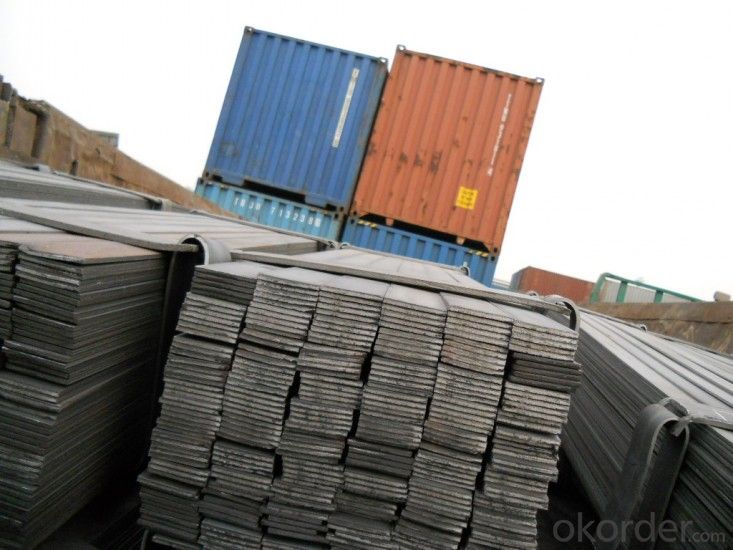
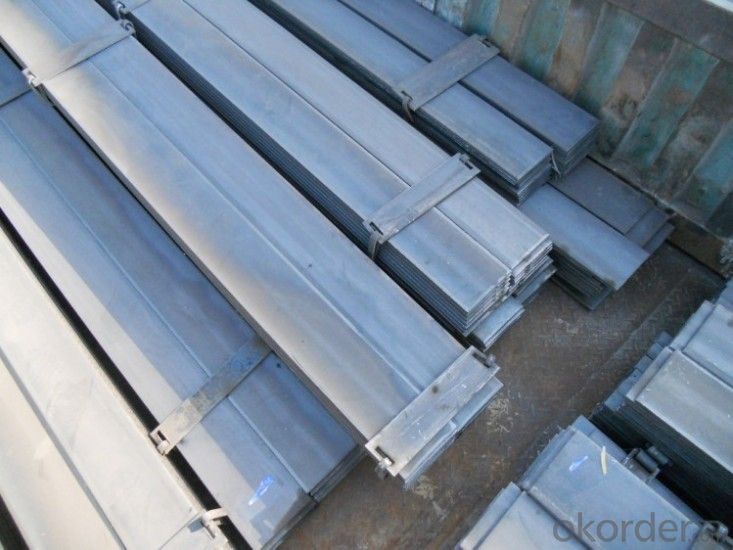
- Q:Do steel flat bars have a specific thermal conductivity?
- Yes, steel flat bars do have a specific thermal conductivity. The thermal conductivity of steel is generally high, making it an excellent conductor of heat.
- Q:Are steel flat bars suitable for welding fixtures?
- Indeed, welding fixtures find steel flat bars to be a suitable choice. The reason lies in the fact that steel flat bars are frequently employed in welding fixtures owing to their ability to provide substantial strength and durability. Consequently, they are considered ideal for applications demanding stability and support. Moreover, steel flat bars can be effortlessly welded, enabling the creation of fixtures that are both stable and dependable. The flat surface of these bars serves as a solid foundation for welding operations, guaranteeing precise alignment throughout the welding procedure. All in all, due to their strength, weldability, and stability, steel flat bars are widely favored when it comes to welding fixtures.
- Q:What are the maximum and minimum thicknesses for steel flat bars?
- The maximum and minimum thicknesses for steel flat bars can vary depending on the specific requirements and standards set by manufacturers and industry regulations. However, in general, the maximum thickness for steel flat bars can range from around 50 millimeters (2 inches) to 150 millimeters (6 inches), while the minimum thickness can be as thin as 3 millimeters (0.12 inches) or even less in some cases. It is important to consult the specific specifications and standards provided by manufacturers to determine the exact maximum and minimum thicknesses for steel flat bars.
- Q:How do steel flat bars withstand heavy loads?
- Steel flat bars are able to withstand heavy loads due to their high strength and stiffness properties. The flat shape of the bar helps distribute the load evenly, while the steel material's inherent strength allows it to resist deformation and breakage under significant pressure. Additionally, steel is known for its excellent tensile strength, which enables it to handle heavy loads without bending or buckling.
- Q:What is the representation of flat steel?
- Flat steel can be finished steel, or can be used as the blank of welded pipe and thin slab for laminated sheet rolling. Main application: flat steel is used as a material, used for making iron, tools and machinery parts, and used as frame structures and escalators for buildings.
- Q:Are steel flat bars suitable for marine or saltwater applications?
- Due to their vulnerability to corrosion, steel flat bars are generally unsuitable for use in marine or saltwater settings. When exposed to saltwater or other corrosive surroundings, steel flat bars can rapidly rust and degrade. This deterioration can jeopardize their structural strength, rendering them unfit for marine use where they would be consistently exposed to saltwater. To guarantee longevity and durability in saltwater applications, it is advisable to opt for materials explicitly engineered for marine environments, such as stainless steel or corrosion-resistant alloys.
- Q:Can steel flat bars be used in the construction of bridges?
- Yes, steel flat bars can be used in the construction of bridges. Steel is widely used in bridge construction due to its high strength, durability, and ability to withstand heavy loads. Steel flat bars are commonly used as structural members in bridge construction, especially for beams, girders, and piers. They provide excellent support and stability, allowing bridges to span long distances and carry heavy traffic loads. Additionally, steel flat bars can be customized and fabricated to specific sizes and shapes, making them versatile and suitable for various bridge designs. Overall, steel flat bars are an essential component in bridge construction, contributing to the strength, safety, and longevity of the structures.
- Q:Can steel flat bars be used for making tools or machinery parts?
- Yes, steel flat bars can be used for making tools or machinery parts. Steel is a versatile and commonly used material in the manufacturing industry due to its strength, durability, and resistance to wear and tear. Steel flat bars can be easily shaped, cut, and manipulated into desired tool or machinery parts, making them a popular choice for various applications. They can be used for constructing frames, supports, brackets, and other structural components in machinery or tools. Additionally, steel flat bars can be further processed through heat treatment or surface treatments to enhance their properties and improve their performance in specific applications. Overall, steel flat bars are a reliable and efficient material option for making tools or machinery parts due to their strength, versatility, and compatibility with various manufacturing processes.
- Q:What are the different sizes available for steel flat bars?
- Steel flat bars are available in various sizes to accommodate different applications and requirements. The sizes of steel flat bars typically range from 1/8 inch thick by 1/2 inch wide, to 1 inch thick by 12 inches wide. Some common sizes include 1/4 inch thick by 1/2 inch wide, 3/8 inch thick by 1 inch wide, and 1/2 inch thick by 2 inches wide. Additionally, steel flat bars can be found in larger sizes such as 1 inch thick by 6 inches wide or even wider. The specific size needed will depend on the intended use of the steel flat bar, such as structural support, fabrication, or general construction. It is recommended to consult a steel supplier or manufacturer to determine the appropriate size for your specific application.
- Q:Can steel flat bars be used for making renewable energy industry equipment?
- Indeed, the utilization of steel flat bars is possible in the production of equipment for the renewable energy industry. Steel, known for its versatility and widespread application in various sectors, including renewable energy, offers numerous advantages in the manufacturing process of renewable energy equipment. Primarily, steel flat bars possess exceptional strength and durability, rendering them appropriate for bearing heavy loads and enduring severe environmental conditions. Renewable energy equipment, such as wind turbine towers, solar panel frames, and hydroelectric power plant components, necessitate robust materials to guarantee prolonged performance. Steel flat bars provide the requisite structural integrity and support indispensable for such equipment. Secondly, steel flat bars can be effortlessly shaped and fabricated into diverse forms and sizes, making them well-suited for customization and production of various renewable energy equipment. Whether the task entails manufacturing brackets, frames, or supports for solar panels or constructing the base for a wind turbine, steel flat bars can be cut, bent, and welded into the desired configuration, thereby enabling flexibility in design and construction. Furthermore, steel flat bars exhibit commendable resistance to corrosion, a vital characteristic for renewable energy equipment that is frequently exposed to moisture, saltwater, and other corrosive elements. This corrosion resistance assures the durability and reliability of the equipment, thereby reducing costs associated with maintenance and replacement. Moreover, steel is a sustainable and recyclable material, aligning perfectly with the principles of renewable energy. Steel flat bars can be recycled and reused, thus mitigating the environmental impact associated with manufacturing and disposal. To conclude, the utilization of steel flat bars in the production of renewable energy industry equipment is justified by their remarkable strength, durability, versatility, and corrosion resistance. With the ability to be fabricated into diverse forms and shapes, steel flat bars can fulfill the specific requirements of various renewable energy applications.
1. Manufacturer Overview |
|
|---|---|
| Location | |
| Year Established | |
| Annual Output Value | |
| Main Markets | |
| Company Certifications | |
2. Manufacturer Certificates |
|
|---|---|
| a) Certification Name | |
| Range | |
| Reference | |
| Validity Period | |
3. Manufacturer Capability |
|
|---|---|
| a)Trade Capacity | |
| Nearest Port | |
| Export Percentage | |
| No.of Employees in Trade Department | |
| Language Spoken: | |
| b)Factory Information | |
| Factory Size: | |
| No. of Production Lines | |
| Contract Manufacturing | |
| Product Price Range | |
Send your message to us
Hot Rolled Flat Steel Bar in Grade Q235B
- Loading Port:
- Tianjin
- Payment Terms:
- TT OR LC
- Min Order Qty:
- 25 m.t.
- Supply Capability:
- 10000 m.t./month
OKorder Service Pledge
OKorder Financial Service
Similar products
New products
Hot products
Related keywords
